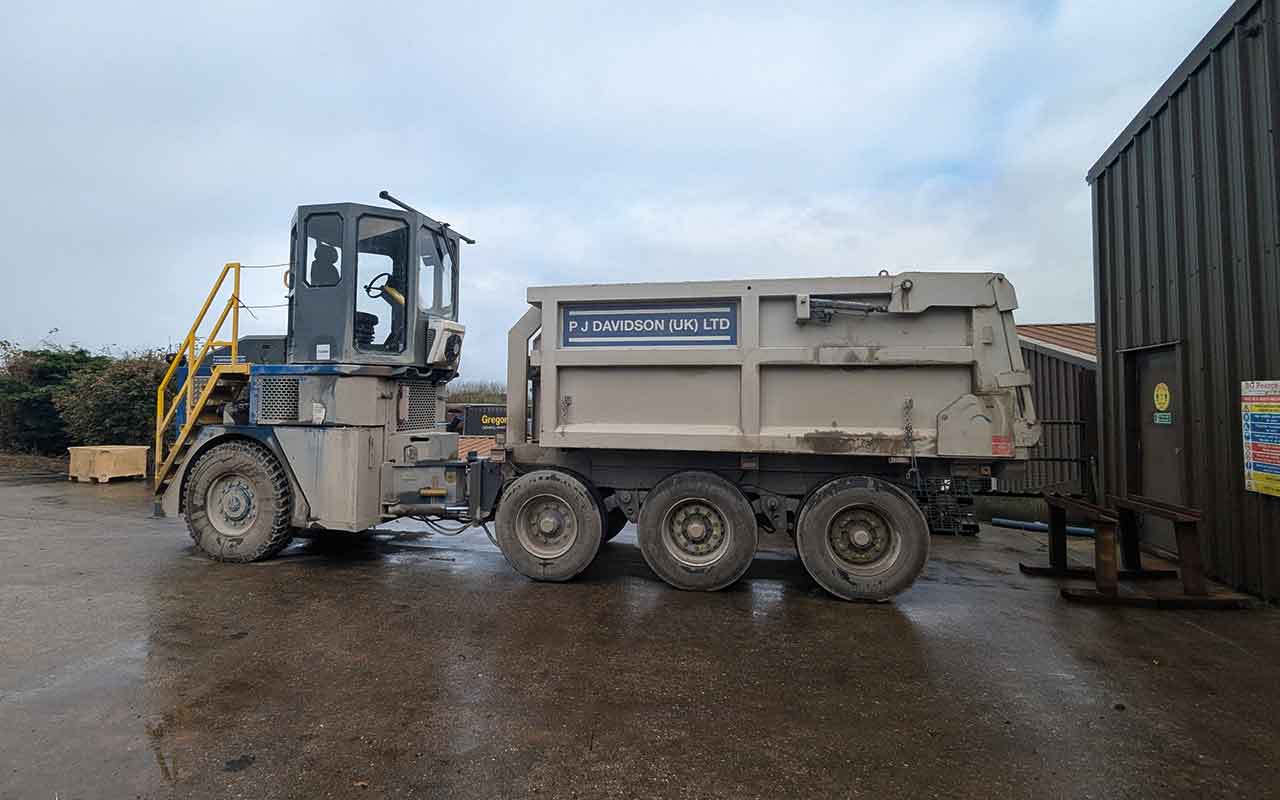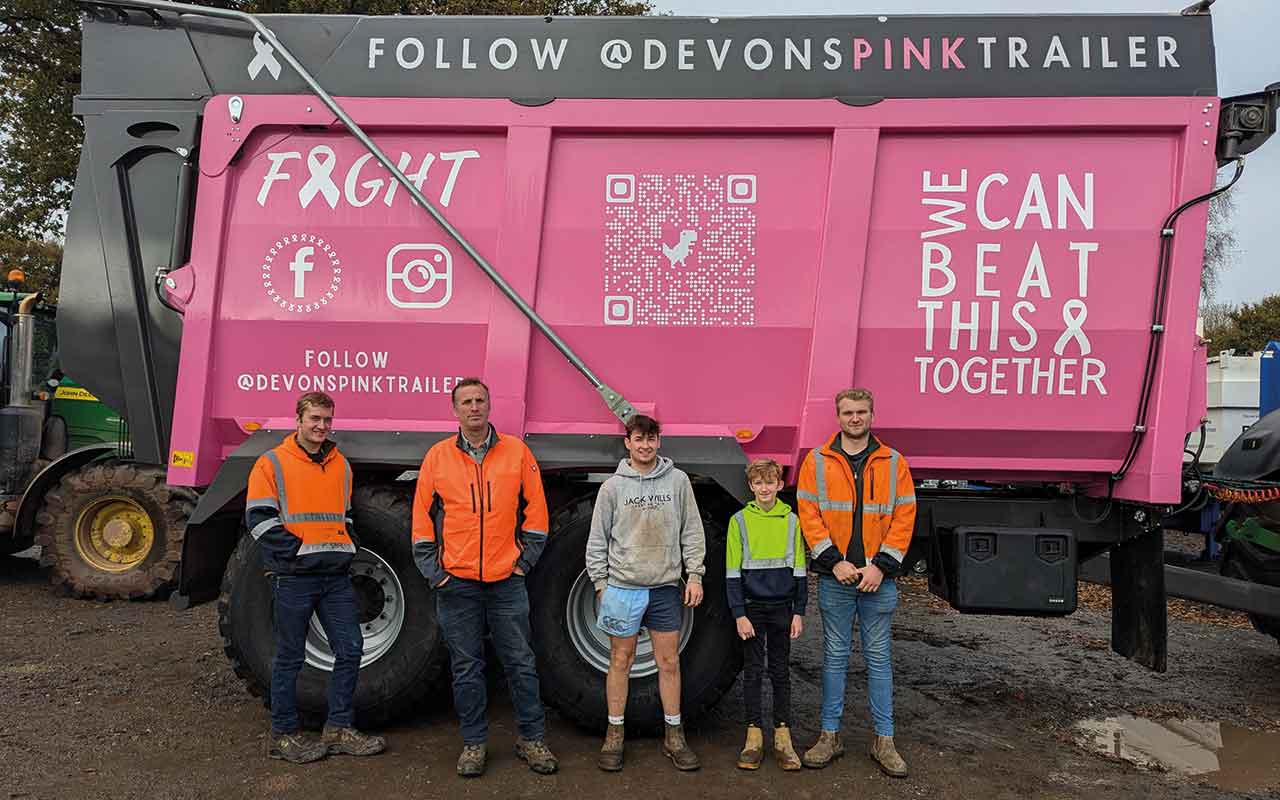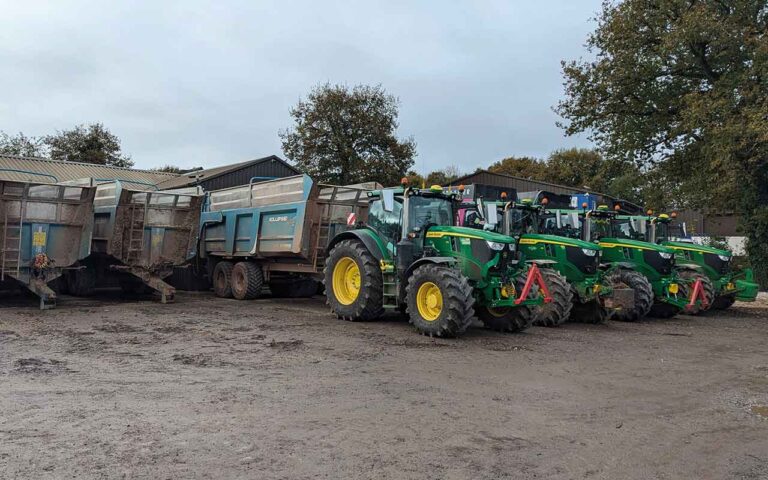When we first visited BG Pearce at the end of 2020, the company had achieved 50 years of operation, building on agricultural work to integrate industrial waste handling, including sewage spreading and agri-plastics baling.
In the four years since then the business has continued to develop, expanding the fleet to more fully re-enter the agricultural contracting market.
Paul Pearce, who manages the business alongside his brother, Tony, says slurry applications have been the driver for this.
“Our waste management work was already attracting local farmers because of the specification of our machinery. Now, we’ve been able to find work with anaerobic digesters in the area and have expanded the fleet to include umbilical applications.”
He gives credit for the expansion of the general contracting side of the business to his sons, Luke and Aran.
The tie-up with the digestate plants has seen the company called out to provide tractors and trailers for forage harvesting contractors, with Luke calling on up to a dozen owner/operators, as well as using BG Pearce’s fleet of tractors and push-off trailers.
Luke adds that working alongside local farmers and contractors has provided many of the opportunities, with word of mouth leading to more interest year on year. “It has helped us to establish repeat custom as well,” he says.
“We’re capable of working at scale, but that doesn’t mean anything if the work isn’t consistent. Our aim is to do exactly what we say we will, and to a high quality.”

Health and safety
Because of the agri-industrial work that saw the business expand rapidly in the late 1980s and 1990s, BG Pearce has had to meet a level of health and safety and maintenance legislation above some contractors in the sector.
This is alongside training the near 30 members of staff who, depending on the season and workload, can find themselves working across every area of the business.
It’s something Paul takes very seriously. As well as ensuring that operators have the required tickets, he also trains them in basic maintenance.
“Like the rest of the industry, we’re finding it increasingly difficult to find experienced staff, so it’s vital that we help them develop. It benefits everyone,” he says.
By training them to perform maintenance tasks as well, Paul limits downtime within the business and lessens liability in case of an incident.
“Daily checks are absolutely vital for this, and we also put all our equipment through comprehensive six-weekly checks so we can be proactive about wearing parts.”
It’s been an area of significant investment for the company. Working with health and safety advisers WT Consultancy, BG Pearce has developed its own smartphone app for operators.
This not only reduces the administrative burden of monitoring hours, location and fuel use, but also prompts staff to conduct daily checks on their equipment. “It’s about building a culture within the business where this becomes second nature,” Paul notes.
Another investment has been made in dashcams for every vehicle in the fleet. This not only covers the business if there is an accident, but helps to protect the operators as well.
“It’s not a case of trusting my drivers,” says Paul. “I believe them when they say something wasn’t their fault, but the dashcams offer that required level of proof.”
Areas of expansion
The level of diversification within BG Pearce has helped the business weather a difficult few years. “If we relied on one thing we would have been in trouble,” says Paul. “But we’ve found that when one sector is down, there’s normally a boost elsewhere.”
He adds that the agri-plastics side of the business has been tough. The company has invested in a new waste baler, which has reduced the time and labour required to run it.
Like the fallen stock disposal, agri-plastics has become something of a fire-fighting job for the firm, with jobs coming in last minute and needing immediate attention. This makes it difficult to plan around.
Where there are gaps in the workload, BG Pearce has collaborated with MMK Engineering – a fabrication firm that rents one of the on-site workshops. “We helped them design and build a new series of self-propelled tipper units, some of which have been sold to work on HS2,” Tony explains.
He says it is one of the benefits of training their staff in the way they do. “Because every area we work in has these ups and downs, we have a level of security because everyone can move across the business as required. This also offers our workers security.”
As for the agricultural contracting, Luke says there are opportunities for further expansion, but they need to be balanced with the relationships the company has with other contractors.
“We’re open to trying anything, but it can’t come at the detriment of what we’re currently doing,” he notes.
“We could invest in different kit and try to fill the year with contracting, but that would compete with the businesses we’re working with now. And then there’s no guarantee that you’ll get the level of work needed to justify that spend.”
With that said, Luke does see some potential in offering drilling. However, with so many growers unsure of the best establishment methods to reduce costs and inputs – and meet increasingly stringent subsidy rules – the decision on which make and model of drill to choose is a tricky one.
Justifying investment
BG Pearce has run John Deere tractors for many years now. When we last visited, the company had four machines, and this has been increased to 10 over the past four years.
The firm has been able to justify this through the contracting work brought in by Luke. However, the increased cost, coupled with operator preference, means Paul may look to a mixed fleet in the future.
“We’re asking operators to spend a long time in the cab, so it has to be an environment they enjoy being in,”
he says. “It’s looking likely that we might start to integrate some Fendt machines into the business over the next few years.”
Much of the investment has been focused on further developing the liquid waste side of the business, with a Storth umbilical setup joining the fleet this year, working alongside the Joskin and Major tankers, which are fitted with dribble bars.
#DevonsPinkTrailer

While the business has continued to develop and grow, this year was marked by the loss of Bernie Pearce, the father of Paul, David, Kym and Tony, and the founder of BG Pearce. He passed away in June, after being diagnosed with cancer. “When we got the diagnosis, we wanted to do something to raise money and awareness for Cancer Research,” explains Paul.
It was Luke who suggested that they request a bespoke livery for one of the new Ktwo push-off trailers, purchased direct. The bright pink paintjob is eye-catching, and QR codes have been added to link people to the donation page. Paul added a cheeky slogan to the back of the trailer – ‘now we have your attention’ – for any drivers behind.
Bernie unfortunately passed away before the trailer was completed, in part due to the various and well-publicised difficulties that Ktwo had earlier in the year, but Paul says the response so far has been excellent.
“We drove the trailer down from the factory in Aylesbury, which garnered a lot of attention, and we’ve been pushing the trailer on social media. Hopefully we can do our bit to raise a little bit of money to fight this,” he says.
You can find out more about Devon’s Pink Trailer on Instagram (@devonspinktrailer) or by following BG Pearce on social media.


